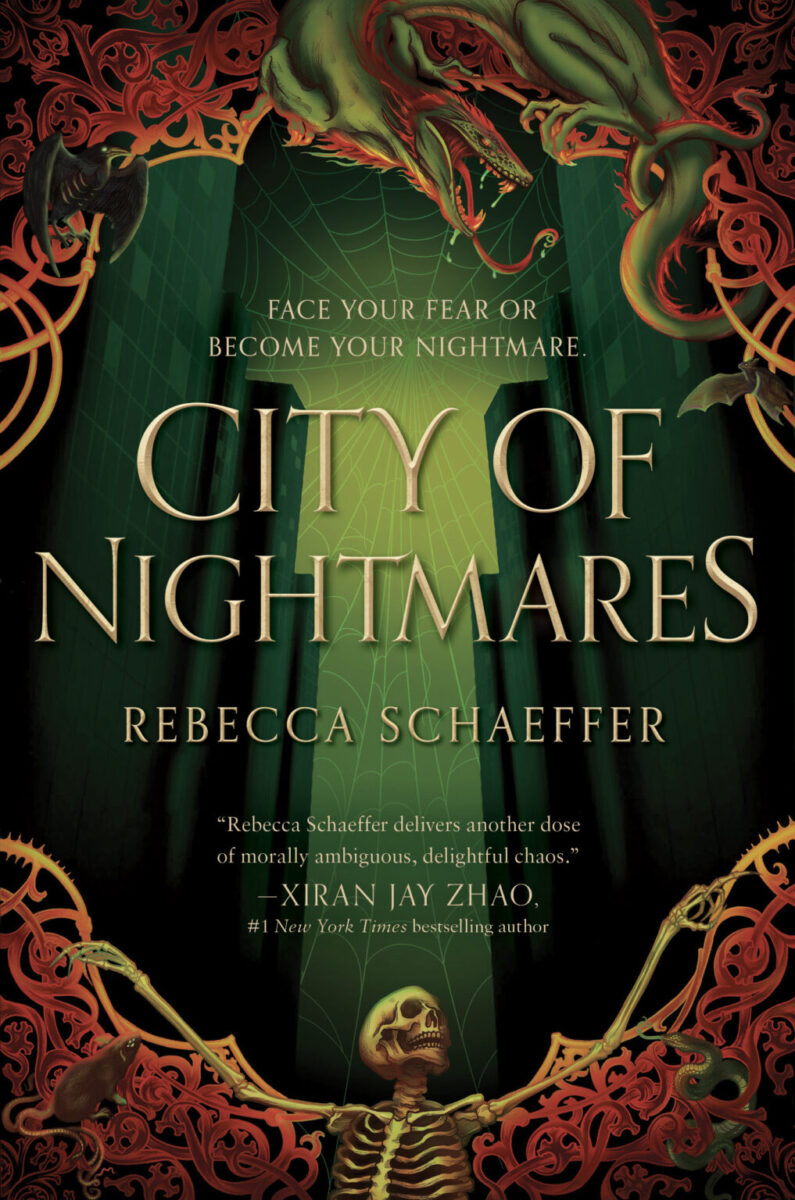In the world of Rebecca Schaeffer’s new City of Nightmares, a hundred years ago, people started having Nightmares. Unlike dreams that came before, and for reasons no one has yet been able to figure out, people who dreamed about their worst fears would become that which terrified them. A century of monstrousness followed, and the world that exists now is perpetually on its guard against Nightmares, whether they take the form of city-wrecking beasts—or far more insidious beings who walk the streets unnoticed.

The technology and social situation is vaguely 1920’s American, with mention of flappers and the relatively recent advent of the personal automobile. There’s also prohibition, although it’s in place to prevent something far more dire than moral turpitude. Alcohol lowers defenses against dreams, and dreams lead to Nightmares.
Ness exists in this world, but it’s hard to say whether she’s really living in it. Deeply traumatized by a childhood incident in which her beloved sister became a Nightmare, she now has a single, all-consuming goal: safety. Ness very bluntly describes herself as a coward, and I don’t disagree with that characterization. The word coward has an undeniably negative valence, and a lot of implied judgement. Ness is asking us to judge her. Schaeffer, however, is asking us whether we should.
Ness is both flawed and—perhaps to some—one of those unlikable female characters we hear so much about. Her PTSD has driven her to become selfish to the point of cruelty to others: she bullies and physically harms—briefly tortures, even—another girl just so that she, Ness, can get a safe work assignment.
What I enjoy about Ness is that she’s aware of these deep flaws. She doesn’t necessarily try to excuse them; quite the opposite, actually. She’s trying in her own flawed, haphazard way to fix them, but trauma is tricky and life just keeps happening.
Schaeffer writes young women who, as a result of their traumas, traumatize others in turn. They’re odd, they do bad things, and their sense of self-preservation is dialed up to 11. And that is so completely accurate to life. Much as we might wish that suffering could make us noble, a lot of times it has to make us weird first.
Obviously I’m talking from experience here; I appreciate Schaeffer’s goblinesque weirdos in a particularly personal way. But I also think they have a larger importance in the genre, too. I see a lot of SFF characters who are traumatized and well-meaning, or fragile, or tough—in other words, characters who remain largely sympathetic. Moral absolutes are a staple of SFF, and we largely want to root for the Good Guys. It’s much harder to sympathize with someone who leaves her best friend to fight a literal nightmare monster while she runs away. Not to get help, mind you. Just runs away as fast as she can.
I think it’s very easy to despise this kind of person, and Schaeffer has set herself an enormous task in making Ness the protagonist we have to root for in City of Nightmares. But she manages it with flair, because Ness herself doesn’t like that she flees even the implication of danger. Nobody hates Ness as much as Ness does, and nobody wants Ness to change more than she does herself. Schaeffer doesn’t let her off the hook for her moral failings, but neither does she dismiss Ness’s struggles. This complexity, given room to breathe by the narrative, makes for very compelling storytelling.
This is undermined a bit by a late development in the book, Ness having been potentially encouraged into this phobia by others. It’s unfortunate to bring the narrative up short like that, but more than that, it’s unnecessary. Ness’s relationship to her own fear is one of the most compelling in the book and it doesn’t need to be excused.
All of the relationships are pretty compelling, though, so it’s not like there aren’t other narrative strands to focus on. Ness’s relationship with Priya is charming and turns surprisingly deep by the end, and her uneasy alliance with Cy follows a similar path, although they’re incredibly different from each other and from Ness. Schaeffer has a knack for creating distinctive and interesting characters with a few bold strokes, and I appreciate the way she’s able to make friendships from contrast as well as from similarity.
Friendship eclipses any hints of romance (or lack thereof), and for the most part I like that. I will say, though, that there still are some awkward attempts to discuss concepts of consent, clumsy not so much because the content is wrongheaded but because Schaeffer is more present than Ness, the author-as-didact taking precedence over a character expressing herself. I think they would have benefited from some editing, but Schaeffer notes in her Afterward that the drafting process was tight. I can only register my concern that YA is becoming quite the churn, and the pace is not always fair to authors.
Overall a promising start to a new duology or trilogy, City of Nightmares comes to a satisfying conclusion while setting up much bigger things for act two. I’m looking forward to what Schaeffer dreams up next.
